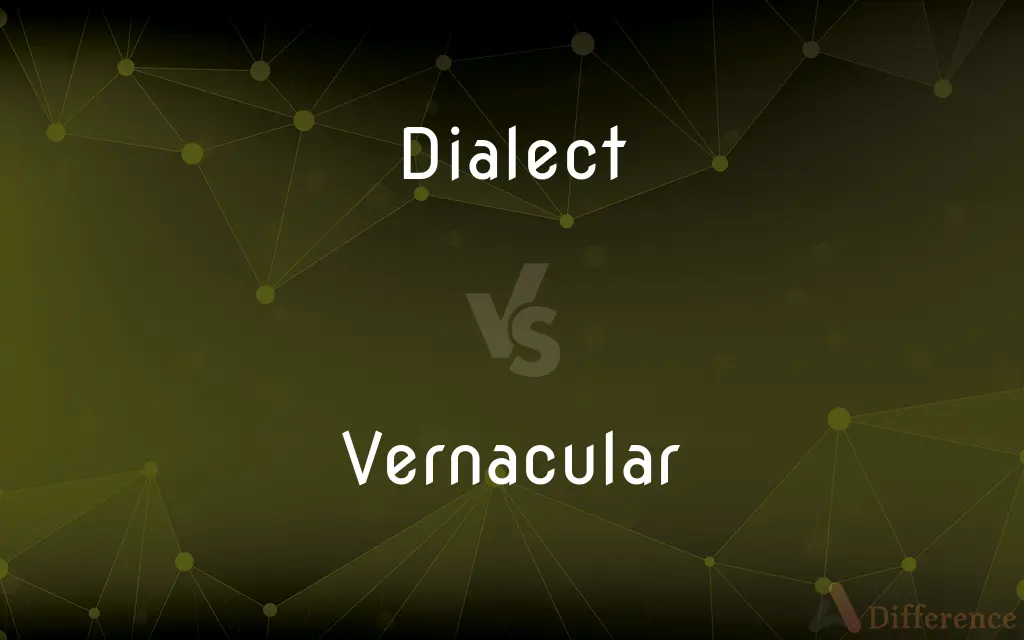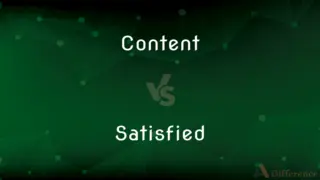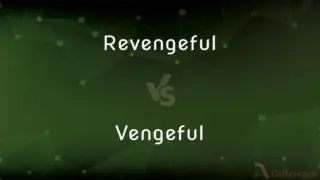Dialect vs. Vernacular — What's the Difference?
By Tayyaba Rehman — Updated on November 7, 2023
Dialect is a regional or social variety of a language with distinct pronunciation, grammar, and vocabulary, while vernacular is the everyday language spoken by ordinary people, often contrasting with literary or official language.

Difference Between Dialect and Vernacular
Table of Contents
ADVERTISEMENT
Key Differences
A dialect is a specific form of a language that is peculiar to a specific region or social group, featuring distinct vocabulary, grammar, and pronunciation. Vernacular, on the other hand, refers to the native language or native dialect of a specific population, especially as it is used in everyday, casual contexts. It's the language of ordinary speech, not formal or literary.
Dialects often manifest in communities that are geographically or socially isolated and can evolve into distinct languages over time. Vernacular, while it can encompass dialects, is broader, encompassing the everyday language used by people, including slang and colloquialisms that aren't standardized or found in formal writing.
While dialects may be categorized by linguists as regional, sociolects, or ethnolects based on their distinctive features and the groups that use them, vernacular is simply the common language or dialect spoken by the general populace. It is the language of home and the marketplace, distinguished from the formal or institutional language used in education, broadcasting, and literature.
Dialects can be seen as branches of a language tree, varying significantly from the standard form, if one exists. Vernacular language, while it may include a standard dialect, is more about the natural and spontaneous use of language in everyday conversation, including idioms, expressions, and phrases unique to a culture or community.
The study of dialects is a branch of dialectology within sociolinguistics, which examines the systematic use of language features across different social or regional groups. Studying vernacular, however, is often focused on the practical, dynamic usage of language and how it reflects the culture and identity of its speakers, often without prescriptive norms.
ADVERTISEMENT
Comparison Chart
Definition
A variation of a language by region or group
The everyday language spoken by a people
Usage
Can be limited to specific groups
Used broadly by the general population
Standardization
Less standardized, with regional rules
Often the standard language in casual contexts
Formality
Can be informal or formal
Typically informal and colloquial
Literary Presence
Less prevalent in literature
Often used in realistic or dialogue-heavy writing
Compare with Definitions
Dialect
Distinct vocabulary within a language family.
The dialect had words that were unheard in other regions.
Vernacular
The everyday language of ordinary people.
He spoke in the vernacular of his urban neighborhood.
Dialect
A subset of language with pronunciation variations.
His dialect made his speech sound musical to outsiders.
Vernacular
Native language of a specific area.
Tourists found the local vernacular charming and unique.
Dialect
A regional language variation with unique syntax.
In his hometown, his dialect was immediately recognized.
Vernacular
Common language excluding professional jargon.
Doctors were advised to use vernacular when talking to patients.
Dialect
A social group's linguistic expression.
She adopted a new dialect after moving to the city.
Vernacular
Colloquial speech distinct from formal language.
The playwright captured the vernacular of the streets brilliantly.
Dialect
The term dialect (from Latin dialectus, dialectos, from the Ancient Greek word διάλεκτος, diálektos 'discourse', from διά, diá 'through' and λέγω, légō 'I speak') can refer to either of two distinctly different types of linguistic phenomena: a variety of a language that is characteristic of a particular group of the language's speakers. Under this definition, the dialects or varieties of a particular language are closely related and are often mutually intelligible, especially if close to one another on the dialect continuum.
Vernacular
A vernacular or vernacular language refers to the language or dialect that is spoken by people that are inhabiting a particular country or region. The vernacular is typically the native language, normally spoken informally rather than written, and seen as of lower status than more codified forms.
Dialect
A particular form of a language which is peculiar to a specific region or social group
The Lancashire dialect seemed like a foreign language
Vernacular
The language or dialect spoken by the ordinary people in a particular country or region
He wrote in the vernacular to reach a larger audience
Dialect
A regional or social variety of a language distinguished by pronunciation, grammar, or vocabulary, especially a variety of speech differing from the standard literary language or speech pattern of the culture in which it exists
Cockney is a dialect of English.
Vernacular
Architecture concerned with domestic and functional rather than public or monumental buildings
Buildings in which Gothic merged into farmhouse vernacular
Dialect
A variety of language that with other varieties constitutes a single language of which no single variety is standard
The dialects of Ancient Greek.
Vernacular
(of language) spoken as one's mother tongue; not learned or imposed as a second language.
Dialect
The language peculiar to the members of a group, especially in an occupation; jargon
The dialect of science.
Vernacular
(of architecture) concerned with domestic and functional rather than public or monumental buildings
Vernacular buildings
Dialect
The manner or style of expressing oneself in language or the arts.
Vernacular
The everyday language spoken by a people as distinguished from the literary language.
Dialect
A language considered as part of a larger family of languages or a linguistic branch. Not in scientific use
Spanish and French are Romance dialects.
Vernacular
A variety of such everyday language specific to a social group or region
The vernaculars of New York City.
Dialect
A lect (often a regional or minority language) as part of a group or family of languages, especially if they are viewed as a single language, or if contrasted with a standardized idiom that is considered the 'true' form of the language (for example, Cantonese as contrasted with Mandarin Chinese or Bavarian as contrasted with Standard German).
Vernacular
The specialized vocabulary of a particular trade, profession, or group
In the legal vernacular.
Dialect
A variety of a language that is characteristic of a particular area, community, or social group, differing from other varieties of the same language in relatively minor ways as regards grammar, phonology, and lexicon.
Vernacular
The common, nonscientific name of a plant or animal.
Dialect
(pejorative) Language that is perceived as substandard or wrong.
Vernacular
Native to or commonly spoken by the members of a particular country or region.
Dialect
A language existing only in an oral or non-standardized form, especially a language spoken in a developing country or an isolated region.
Vernacular
Using the native language of a region, especially as distinct from the literary language
A vernacular poet.
Dialect
A variant of a non-standardized programming language.
Home computers in the 1980s had many incompatible dialects of BASIC.
Vernacular
Relating to or expressed in the native language or dialect.
Dialect
(ornithology) A variant form of the vocalizations of a bird species restricted to a certain area or population.
Vernacular
Of or being an indigenous building style using local materials and traditional methods of construction and ornament, especially as distinguished from academic or historical architectural styles.
Dialect
Means or mode of expressing thoughts; language; tongue; form of speech.
This book is writ in such a dialectAs may the minds of listless men affect.Bunyan.The universal dialect of the world.
Vernacular
Occurring or existing in a particular locality; endemic
A vernacular disease.
Dialect
The form of speech of a limited region or people, as distinguished from ether forms nearly related to it; a variety or subdivision of a language; speech characterized by local peculiarities or specific circumstances; as, the Ionic and Attic were dialects of Greece; the Yorkshire dialect; the dialect of the learned.
In the midst of this Babel of dialects there suddenly appeared a standard English language.
[Charles V.] could address his subjects from every quarter in their native dialect.
Vernacular
Relating to or designating the common, nonscientific name of a biological species.
Dialect
The usage or vocabulary that is characteristic of a specific group of people;
The immigrants spoke an odd dialect of English
He has a strong German accent
Vernacular
The language of a people or a national language.
A vernacular of the United States is English.
Dialect
A form of a language with grammatical differences.
Teachers had to learn the local dialect to communicate effectively.
Vernacular
Everyday speech or dialect, including colloquialisms, as opposed to standard, literary, liturgical, or scientific idiom.
Street vernacular can be quite different from what is heard elsewhere.
Vernacular
Language unique to a particular group of people.
For those of a certain age, hiphop vernacular might just as well be a foreign language.
Vernacular
A language lacking standardization or a written form.
Vernacular
Indigenous spoken language, as distinct from a literary or liturgical language such as Ecclesiastical Latin.
Vatican II allowed the celebration of the mass in the vernacular.
Vernacular
(architecture) A style of architecture involving local building materials and styles, not imported.
Vernacular
Of or pertaining to everyday language, as opposed to standard, literary, liturgical, or scientific idiom.
Vernacular
Belonging to the country of one's birth; one's own by birth or nature.
A vernacular disease
Vernacular
(architecture) Of or related to local building materials and styles; not imported.
Vernacular
(art) Connected to a collective memory; not imported.
Vernacular
Belonging to the country of one's birth; one's own by birth or nature; native; indigenous; - now used chiefly of language; as, English is our vernacular language.
His skill in the vernacular dialect of the Celtic tongue.
Which in our vernacular idiom may be thus interpreted.
Vernacular
The vernacular language; one's mother tongue; often, the common forms of expression in a particular locality, opposed to literary or learned forms.
Vernacular
A characteristic language of a particular group (as among thieves);
They don't speak our lingo
Vernacular
The everyday speech of the people (as distinguished from literary language)
Vernacular
Being or characteristic of or appropriate to everyday language;
Common parlance
A vernacular term
Vernacular speakers
The vulgar tongue of the masses
The technical and vulgar names for an animal species
Vernacular
Nonstandard language used in daily communication.
The vernacular expressions gave the novel authenticity.
Common Curiosities
What is vernacular?
Vernacular is the language or dialect spoken by the ordinary people in a specific region, often contrasting with formal or official language.
What is a dialect?
A dialect is a form of a language that is spoken in a particular geographic area or by a specific group of people, characterized by unique pronunciation, grammar, and vocabulary.
Can dialects be considered vernacular?
Yes, dialects can be considered vernacular when they are the common, everyday speech of a particular region.
Is vernacular always a dialect?
Vernacular is not always a dialect; it refers broadly to everyday language, which can include the standard language.
How do dialects develop?
Dialects develop through geographical, social, or ethnic separation, which leads to unique linguistic features.
How does vernacular influence literature?
Vernacular often gives literature a sense of authenticity and local color by reflecting the speech patterns of a region or group.
Are dialects in danger of disappearing?
Many dialects are in danger of disappearing due to globalization and the dominance of standard languages in media and education.
Do dialects have rules?
Dialects have their own internal rules and structures, although these may differ from the standard language norms.
Why do people often switch between dialect and vernacular?
People switch between dialect and vernacular for reasons such as context, audience, or to express identity.
Can a person speak more than one dialect?
Yes, a person can speak or understand multiple dialects, often due to migration, education, or exposure to different language communities.
Is vernacular considered proper language?
Vernacular is proper in its context of everyday communication but may not be considered the standard in formal settings.
Is there a prestige dialect?
In many societies, a standard dialect, often based on the speech of the upper class or capital region, is considered the prestige dialect.
Can dialects influence a standard language?
Yes, dialects can influence the vocabulary, pronunciation, and even grammar of a standard language over time.
How is vernacular preserved?
Vernacular is preserved through oral tradition, local literature, music, and efforts to document and study everyday language.
How can one study dialects and vernacular?
Studying dialects and vernacular involves fieldwork, recordings, and analysis of speech patterns among different language communities.
Share Your Discovery

Previous Comparison
Content vs. Satisfied
Next Comparison
Revengeful vs. VengefulAuthor Spotlight
Written by
Tayyaba RehmanTayyaba Rehman is a distinguished writer, currently serving as a primary contributor to askdifference.com. As a researcher in semantics and etymology, Tayyaba's passion for the complexity of languages and their distinctions has found a perfect home on the platform. Tayyaba delves into the intricacies of language, distinguishing between commonly confused words and phrases, thereby providing clarity for readers worldwide.














































